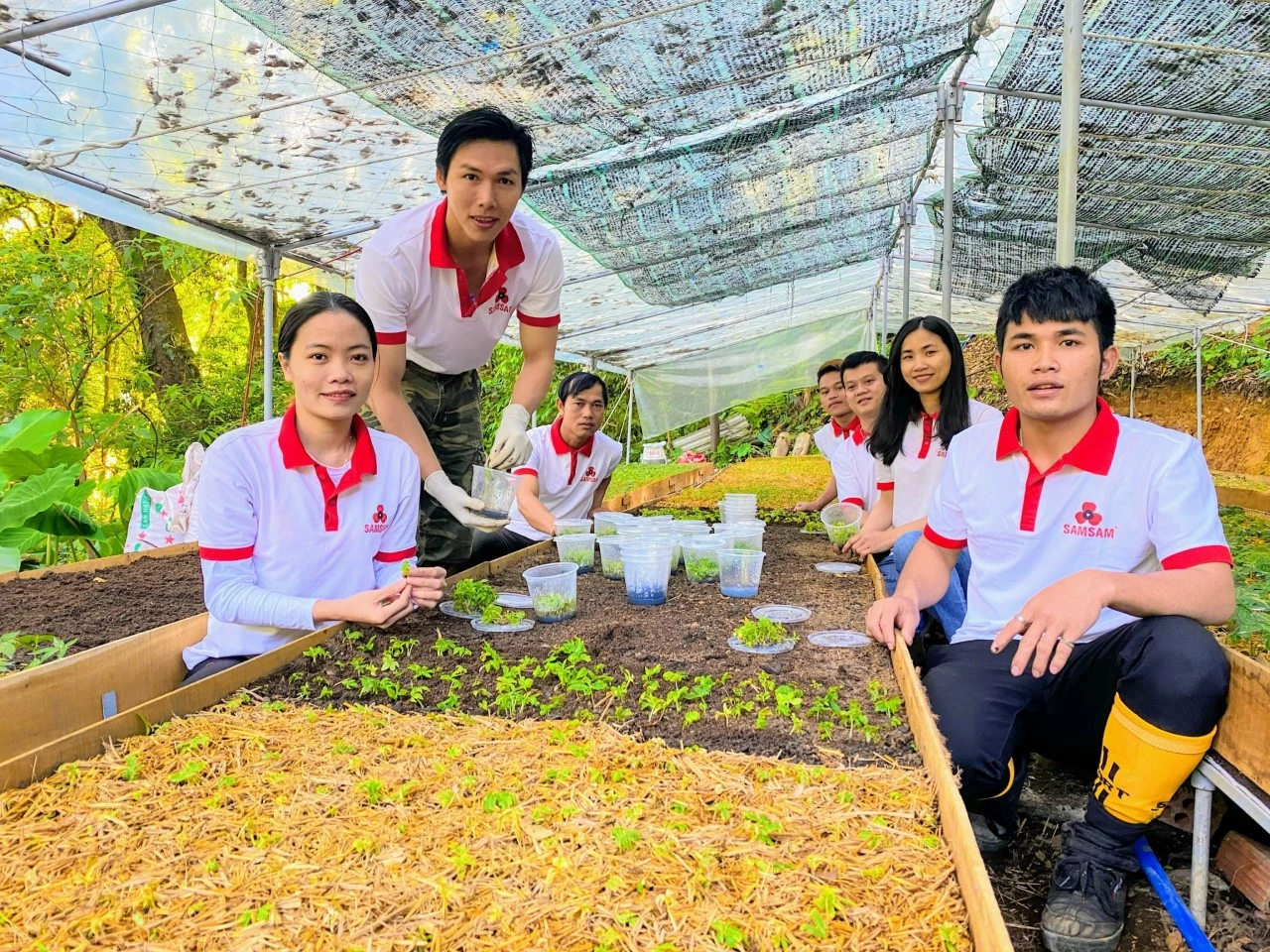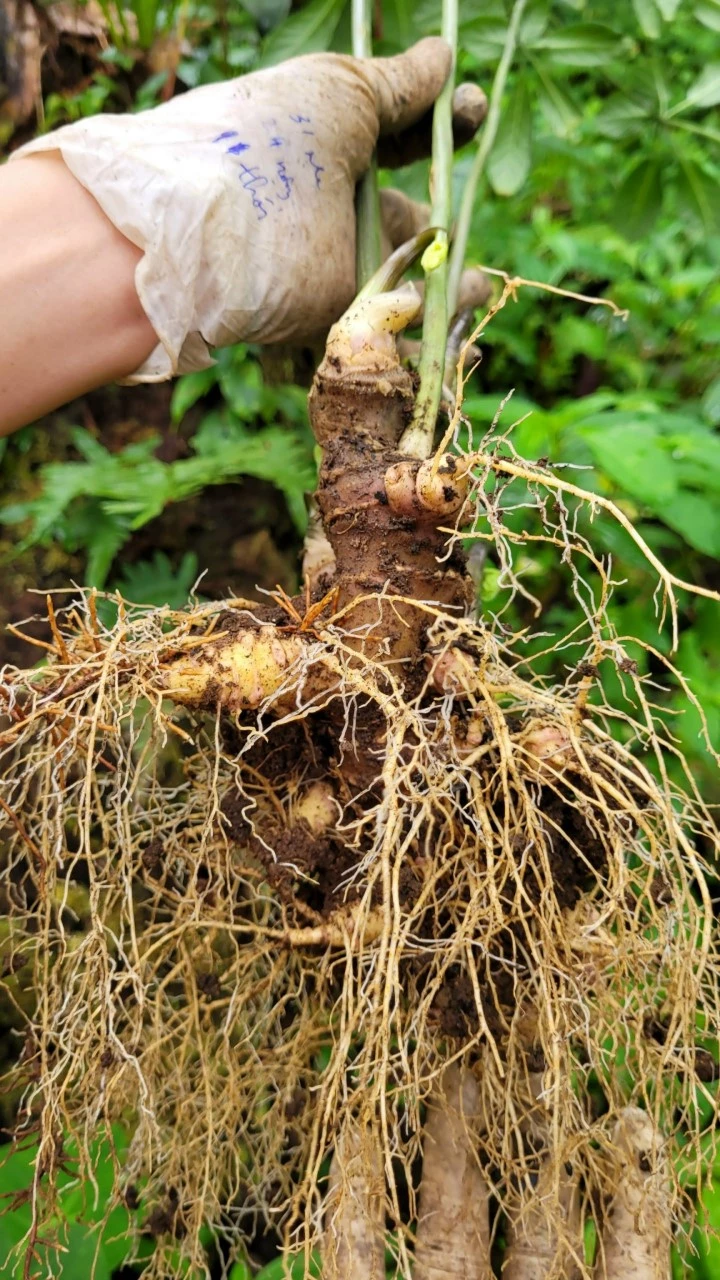DFCD grants support for ginseng grower that helps Vietnamese communities out of poverty
The Dutch Fund for Climate and Development (DFCD) has approved grant support for SamSam, a Vietnamese ginseng grower seeking to scale up its production in one of the country’s poorest regions.
SamSam specializes in planting and producing seedlings of Vietnamese ginseng whilst working alongside the national government's vision of using ginseng to take communities out of poverty. By providing quality seeds and seedlings to smallholders and enterprises and teaching them how to mature the plants more efficiently, local communities will be able to get a better price for their Vietnamese ginseng (Ngoc Linh ginseng).
The project has been put forward by the World Wide Fund for Nature Netherlands (WWF-NL) which manages together with SNV Netherlands Development Organisation the DFCD’s Origination Facility to develop new projects for the investment fund. With the approval of the grant, WWF has the intention to sign a €275,000 grant funding agreement with SamSam.

Growing market
The global ginseng extracts market was valued at $24.5 million in 2019. The root of the plant is used for various things: from medication to beauty products. An increase in consumer acceptance of oriental flavours and demand for Chinese herbal medicine are expected to boost the market’s growth further.
Korea and China are the main producers of ginseng. In Vietnam, the ginseng market is only starting to grow slowly, while local demand for quality ginseng is so high that the country is currently importing it from Korea.
Plant to escape poverty
Ginseng is predominantly grown in Nam Tra My, one of Vietnam’s poorest regions, where many smallholders are deemed as ‘poor’ or ‘near poor’. The local government has introduced a series of policies to reduce poverty in this region. It has identified the cultivation of Ngoc Linh ginseng as the 'plant to escape poverty'.
Most Vietnamese ginseng is grown by smallholders in small plots in the forest and farmers lack the knowledge and quality inputs to maximise their yields. The plant is very delicate. If it is not grown in its natural forest environment under perfect conditions, it is very susceptible to disease and will likely die. By helping farmers grow ginseng more efficiently and increasing the likelihood of the plant surviving, their income can increase significantly. The plant becomes more valuable with age. By comparison: a one-year-old seedling is worth € 14,80 and a six-year-old-or-older seedling is worth an average of € 244,00 depending on its root’s weight.
Research and knowledge sharing
SamSam knows exactly how to cultivate the plant following years of research studying the survival, flowering, and fruiting ability of Ngoc Linh ginseng. It successfully created a source of natural fertilizer to stimulate the growth of Ngoc Linh ginseng. The company also developed a method together with microbiologists to make the plants less prone to various diseases. SamSam’s plant mortality rate is on average 25% lower than the historical mortality rate of other commercial groups over the first seven years.
To share its knowledge, SamSam will build a primary breeding centre providing quality ginseng seedlings to enterprises and households. Through training and courses, SamSam will teach their methods to smallholders, community groups and associations. This combination should result in a higher survival rate of the plants, thus a better selling price once the smallholders want to sell their crops.
The project will also contribute significantly to providing employment opportunities, on three distinct levels: the production of the seed, the production of ginseng products and the ability to expand farmers' businesses and hire more people.

Scaling up cultivation
The DFCD's grant support helps SamSam to acquire seedlings, seeds, earthworm vermicompost and land needed for further expansion. It is planning to grow 1 million seedlings by 2024 and 5 million by 2028. These seedlings will be harvested to maturity on SamSam's 100 hectares of forest.
Currently, around 1,500 farmer households grow medicinal herbs of which 1,200 of already grow Ngoc Linh ginseng. With its expansion plan, SamSam can quickly grow its business towards working with 2,500 smallholder households. At the same time, the company works together with a growing number of enterprises. Since Samsam participated in this industry early, many new enterprises come to them to sign contracts for business cooperation.
Further investment has secured up to 175 hectares of land. SamSam has the right to cultivate ginseng for 40 years in this area. The next phase of this expansion is to raise cattle in combination with raising earthworms produces organic fertilizer as nutritional input for Ngoc Linh ginseng. To achieve this, the company is seeking an investment of €10.3 million, which it hopes to receive through a loan from the DFCD.
Stuart Beavis, Regional Lead WWF Asia
"SamSam has the potential to be an amazing project, it grows ginseng under the now, protected canopy of the forest and works closely with the local community adding to their skillset and income. The company is also perfectly aligned with the National Government's vision for this commodity."
Nguyen Duc Luc, General Director
"SamSam has been trading roughly seven years of effort, sweat and tears off for what the company does best, but we must be quick to seize this opportunity to become a leader in this industry. Otherwise, others will take it. Vietnam ginseng (Ngoc Linh ginseng) exclusively grows in Vietnam, which brings the company an incredibly competitive advantage. With this DFCD investment in a ginseng breeding center and current land use, SamSam is likely to become the leader in this ginseng industry."
Contact
For more information, Stuart Beavis, Regional Lead WWF DFCD Asia Pacific at sbeavis@wwf.org.hk.
In case you have any grievances in relation to this project of the DFCD’s Origination Facility, please contact us through our service desk at servicedesk@wwf.nl.
About DFCD
The DFCD enables private sector investment in projects aimed at climate adaptation and mitigation in developing countries. The Dutch Ministry of Foreign Affairs has made available € 160 million to increase the resilience of communities and ecosystems most vulnerable to climate change. The DFCD is managed by a pioneering consortium of Climate Fund Managers (CFM), Worldwide Fund for Nature Netherlands (WWF-NL) and SNV, led by the Dutch Entrepreneurial Development Bank, FMO.

